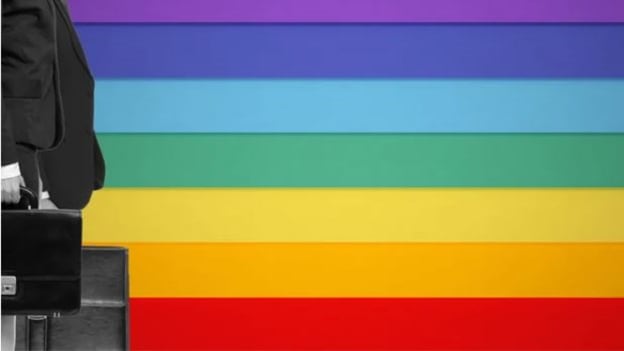Are Thai workplaces still unwelcoming to LGBT people?

In Thailand, one-quarter of non-LGBT people apparently think it is all right to discriminate against LGBT people in work settings; another 11.5 percent are undecided.
This insertion of personal bias into what should be a professional setting was among the findings of a recently released report by the United Nations Development Program. It signifies a belief that LGBT people should not be allowed in the workplace, which is a stark contrast to Thailand’s reputation for being, among the ASEAN countries, the safest and even the most welcoming for LGBT people.
The report, “Tolerance but not Inclusion”, found that under Thai society’s broader attitude of tolerance lies an ongoing struggle to define when and where LGBT people can live their lives openly and honestly. And the workplace, for many, does not appear to be such an inclusive environment.
The shape of workplace discrimination
“In Thailand, you can have a lot of differences and people generally tolerate that. But if the differences come too close, like in the family or in the workplace, then it becomes awkward,” says inclusive workplace advocate Paul Overdijk, the co-founder of not-for-profit foundation Workplace Pride. And Thai companies, he adds, are poorly prepared to handle such awkwardness. Diversity is a foreign concept to them, and they seldom have experience managing it.
For LGBT job-seekers, the companies’ attitude becomes a significant handicap. A 2018 study by the International Labor Organization found that almost half of LGBT job-seekers in Thailand reported seeing job advertisements that specifically exclude their sexual orientation, gender identity, or gender expression; another 33 percent said they were questioned about their sexuality and personal lives during job interviews. A World Bank study during the same period found that more than half of LGBT job seekers felt their applications had been denied because of their sexual orientation.
LGBT people are also more likely than non-LGBT people to be excluded from higher-status and higher-paying jobs, either because they are not hired for these jobs in the first place or because they are denied professional advancement. The UNDP report found that they face “patterns of verbal harassment, loss of credibility, and lack of acceptance and respect by colleagues.”
All these things place a weight of fear on LGBT people in the workplace, one which is not unfounded: the ILO survey found that 14 percent of LGBT employees in Thailand had been fired from their jobs due to their gender identity or sexual orientation.
Companies pay a price as well
Thai law may not have provisions against workplace discrimination, but companies which permit it are essentially throwing monetary and human capital away, says Overdijk. “People who are hiding their identity spend a lot of energy doing so. Studies have shown that on average, LGBT people who have to hide at the workplace are 30 percent less productive compared to their colleagues,” he points out. “That means a company that keeps people hiding is throwing away 30 percent of the salaries they pay.”
The UNDP report also highlights how workplace discrimination backfires on society as a whole simply by dragging down income earners and, by extension, their families.
“The ability for members of society to earn a sustainable living as well as be fully productive workers is central to the successful economic development of a nation,” wrote Professor Suen Yiu-tung from the Chinese University of Hong Kong, the author of the UNDP report. “Stigma and discrimination block LGBT people and their families from reaching their full potential as workers, students and community members.”
Employers can provide a safer, kinder working environment
People Matters spoke to Dow Chemical Thailand, which partnered with UNDP to launch the “Tolerance but not Inclusion” report, on how the company makes its workplace safer and more inclusive. Dow was the first company in the chemical industry to create an employee resource group specifically for LGBTQ+ issues, and has seen considerable success in increasing and maintaining a sense of belonging and work-life satisfaction among group members.
Leaders of the group, known as GLAD, shared a few pointers about how they have made their model work since its creation in 2000. The most important thing, they said, was to break down misconceptions and stigma from the very beginning: to educate employees that the group was open to anyone who wanted to learn more or offer support.
The second thing was to gain the visible support of leaders within the company. This went a long way towards increasing the acceptance of other employees.
Most importantly, the group focused on education and acceptance. It is firm that its objective is not to make all of Dow’s LGBTQ+ employees come out, nor does it intend to make all the other employees support it.
A spokesperson from the employee resource group told People Matters: “We can’t force people to be allies, nor can we expect that everyone will support us on our journey; however, we do expect everyone is respectful and doesn’t discriminate--this is a part of Dow’s core values.” It is often about educating people, the spokesperson added: helping them to handle LGBTQ+-related topics, to build their knowledge of issues that affect the community, and demonstrating the importance of inclusion and allyship.
Commenting on the role that such groups play in the workplace, Overdijk says: “Visibility is very important. As long as gays and lesbians are not visible at the workplace, the stigma will remain, because no one knows there is a problem. But of course, they can only be visible when it is safe.”
And how can a workplace be made safe for LGBTQ+ employees?
By being very firm about the reality that they are people like you and I, says Overdijk. “They are just like other people. They live their lives. They fall in love. They are employees like any others.”
















